How Russia attempts to widen its arsenal of pro-war propaganda
Kremlin seeks to maintain domestic support by marketing patriotic symbols and slogans, from the letter Z to “I am not ashamed.”
How Russia attempts to widen its arsenal of pro-war propaganda

BANNER: A VK account advertises women’s t-shirts featuring the letter Z and the hashtag #своихнебросаем (“We don’t leave ours [behind]”). (Source: Olga Reimont/archive)
To justify its war in Ukraine and maintain domestic support, the Kremlin is attempting to widen its arsenal of pro-war propaganda tools. Among the most influential propaganda instruments is the pro-war “Z” symbol, which both the Kremlin and its supporters have seized to promote the war, including through product merchandising.
Recent polling from the Levada Center indicates that the Kremlin’s escalation of domestic pro-war rhetoric may be working. The independent Russian polling organization found that approval ratings for President Vladimir Putin have increased, rising from 63 percent in November 2021 to 83 percent in March 2022. In the center’s most recent poll, 81 percent of respondents said they “definitely support” or “mostly support” the Russian armed forces’ actions in Ukraine.
Soon after the invasion of Ukraine began on February 24, the Kremlin escalated its propaganda campaign to gain and maintain popular support for the war. As part of the campaign, the letter “Z” became a pro-war symbol among Kremlin media, officials, and supporters. Its origin comes from Russian armed forces painting a zig-zag “Z” pattern onto their vehicles to avoid friendly-fire incidents. The “Z” markings went viral, and soon pro-war supporters began to paint “Z” on their cars, sheds, and windows. At an international gymnastics competition in Qatar, a Russian gymnast wore a “Z” symbol on his uniform. Elsewhere, in Kazan, Russia, terminally ill children were shaped into a giant “Z” outside of a hospice. Several propaganda videos featuring young Russians expressing support for the war while wearing hoodies and sweatshirts with a “Z” circulated online.

Another component in Russia’s pro-war propaganda toolbox is hashtags, including #МнеНеСтыдно (#IAmNotAshamed), which was initially used to demonstrate support for Russia after local celebrities publicly denounced the war. The DFRLab has previously reported on failed attempts to popularize the hashtag on Twitter and Facebook. Engagement with the hashtag was low and decreased dramatically from February 26 to March 2. Further analysis of the hashtag through May 18, 2022 showed that engagement continues to be low.

Russia’s attempts to block Western social media networks could explain some of the limited engagement. However, a recent report from the pro-Kremlin online outlet RBC.ru analyzed blocked social media outlets and found that millions of Russians were still using Facebook, Instagram, and Twitter, likely through virtual private networks (VPNs).
At the time of publishing, the #IAmNotAshamed hashtag had been mentioned in 24,202 posts on Russian social network VKontakte (VK). In many instances, #IAmNotAshamed was also accompanied by other patriotic hashtags, such as #Z, #ZaПутина (“For Putin”), and #своихнебросаем (“we don’t leave ours [behind]”).
Various VK accounts shared Kremlin narratives under the Russian version of the #IAmNotAshamed hashtag. One of the narratives claimed that Russians are descendants of “heroes who won the Great Victory in 1945” against Nazi Germany and that the Russian military’s current task is to destroy Ukraine’s “Nazi regime.” Another narrative declared that Russia’s war in Ukraine is a “struggle” for Russia’s “sovereignity and the future of the country.” Some narratives accused the United States and Canada of training Ukrainian “neo-Nazi units,” while others portrayed Putin as “a leader in the fight against global injustice.”
The DFRLab identified unusual behavior when analyzing the #IAmNotAshamed hashtag. At least five accounts posted a pro-Putin image with identical text, all within a period of only a few minutes. In all instances, the Russian-language caption read, “Only a true Russian leader understands the meaning of the term ‘patriotism.’ We love our homeland, and we are proud of it! Because being Russian means being honest.” The posts appear to be coordinated, but the DFRLab could not confirm a further relationship between the accounts.

Another VK account took advantage of the #IAmNotAshamed hashtag to sell t-shirts printed with the hashtag and the “Z” symbol. The combination of the letter Z and the hashtag has previously appeared on t-shirts as part of a pro-war campaign.

A different VK account promoted Russian Telegram channels using the #IAmNotAshamed hashtag. In its posts, the account urged its followers to subscribe to “important #Z Telegram channels.” The list included channels belonging to Chechen leader Ramzan Kadyrov, pro-Putin journalist Vladimir Solovyov, and other Kremlin-affiliated groups.

VK communities and pages that featured the “Z” symbol in their profile images also heavily promoted the #IAmNotAshamed hashtag.

Meanwhile, on March 30, Kremlin state-owned news outlet RT reported on the popularization of pro-war symbols in Russia. According to RT, Russian entrepreneurs are seeking to brand products with “Z” and “V,” as they are now considered “patriotic symbols” in the country.
RT reported that since the outset of the invasion of Ukraine, the Russian patent and trademark office has received “dozens of applications to register various trademarks using the symbols ‘V’ and ‘Z.’” RT stated that Russian entrepreneurs are rushing to register for the right to use pro-war symbols exclusively on various products to protect themselves from counterfeiters. RT also documented requests to register pro-war hashtags, including #мненестыдно (“IAmNotAshamed”), #своихнебросаем (“we don’t leave ours [behind]”), and #ярусский (“I am Russian”). #своихнебросаем, in particular, has proven to be particularly successful on VK, with more than 700,000 mentions at the time of writing.

As the Kremlin seeks to increase domestic support for its invasion of Ukraine, pro-war campaigners have been quick to rally behind viral symbols, with the letter “Z” becoming the most visible, alongside promoting patriotic hashtags and merchandise. Additionally, the banning of many Western social media platforms allows Russia to control the narrative and, in doing so, provoke explicitly patriotic, pro-war sentiment.
Cite this case study:
Eto Buziashvili, “How Russia attempts to widen its arsenal of pro-war propaganda,” Digital Forensic Research Lab (DFRLab), May 18, 2022, https://medium.com/dfrlab/how-russia-attempts-to-widen-its-arsenal-of-pro-war-propaganda-c0a6181b4efb.

